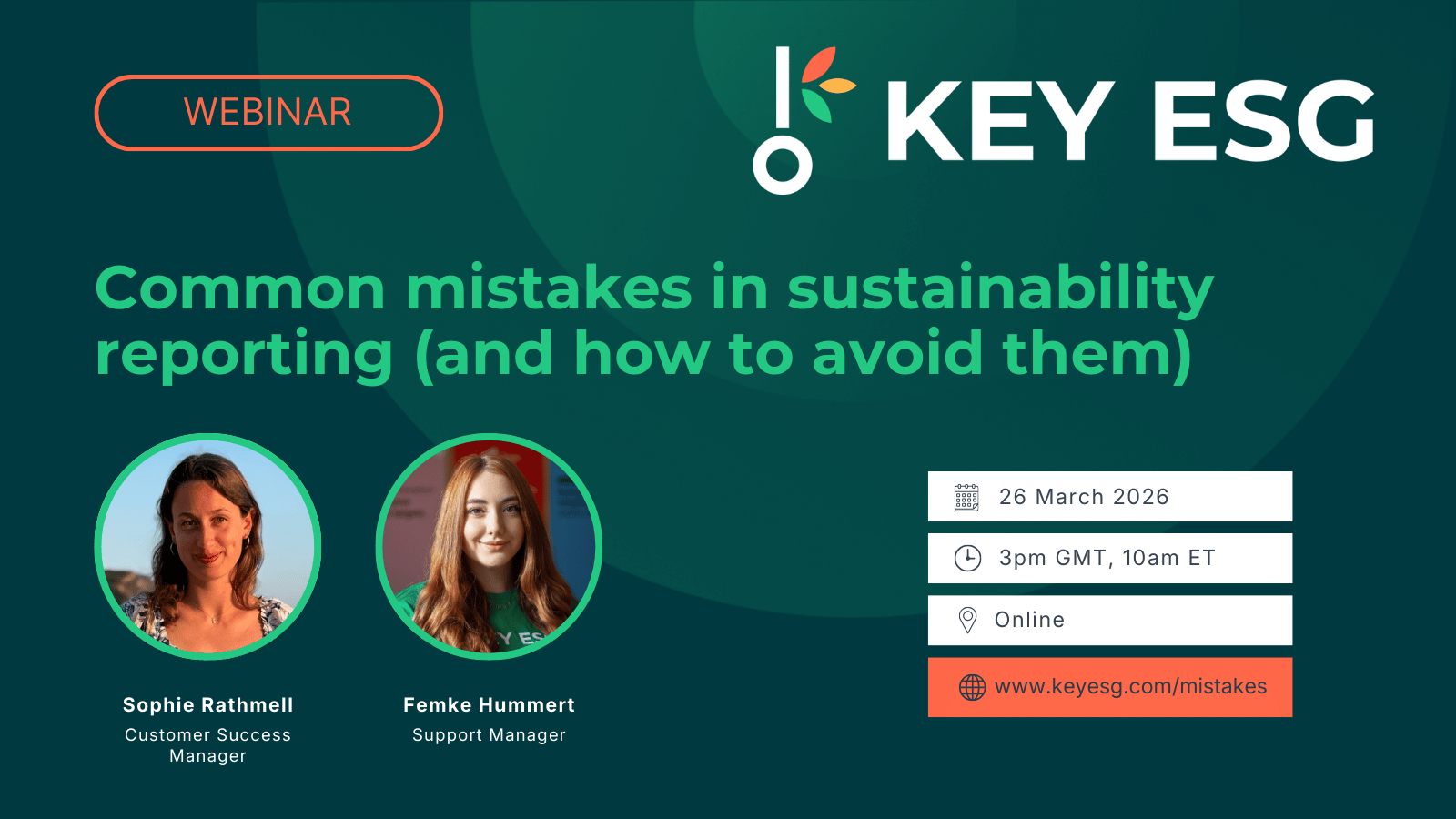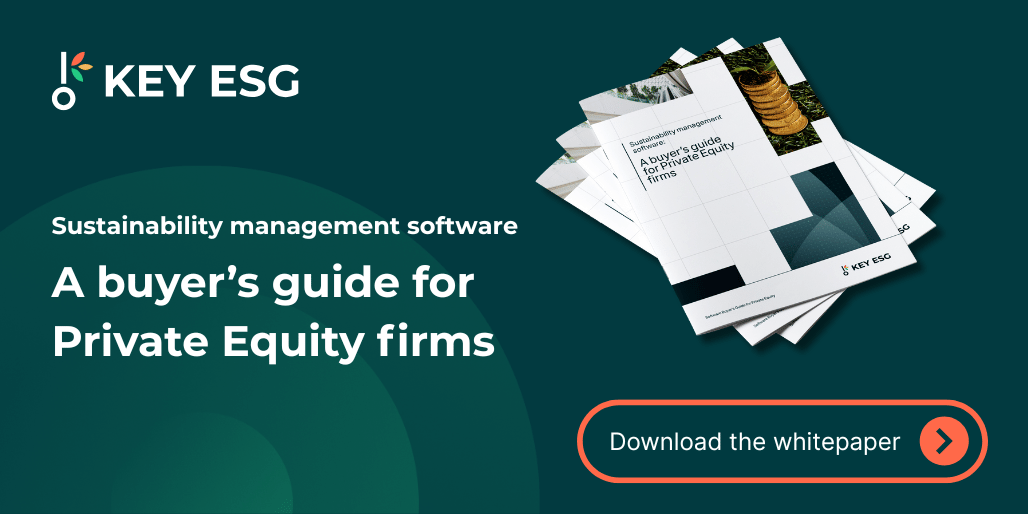11 Ways to Get Your Portfolio Companies On Board with ESG Reporting
Published: 6 Jun 2023 · Last updated: 15 Oct 2023
As legislation continues to evolve and businesses become more conscientious, Environmental, Social, and Governance (ESG) factors have become increasingly important for private equity (PE) companies and fund managers. Investors must ensure that their portfolio companies embrace ESG reporting to drive sustainable growth and mitigate risks. However, getting companies on board and motivated can prove difficult. Especially considering the number of regulations firms need to adhere to nowadays.
In this article, we’ll explore eleven effective strategies that fund managers can easily implement to improve firms’ engagement, motivate portfolio companies, and generally get staff on board with ESG reporting.
1. Start with the Basics
Every journey starts with a single step. Overwhelming your portfolio companies with hundreds of different metrics to track is just going to increase the hurdle to get started.
Begin by educating your portfolio companies on the fundamentals of ESG reporting. Help them understand the significance of ESG factors and their impact on business operations and stakeholder perceptions. Together with them you can then identify several main metrics that need to be tracked. Once your teams are comfortably tracking a few metrics, they’ll feel more ready to expand the number of metrics they track and manage. ESG management is a marathon, not sprint.
2. Bring in the Right People
Appoint a single point of contact within each portfolio company to drive ESG collection efficiently and ESG initiatives effectively. Look for individuals who have sufficient authority to lead the ESG data collection and management efforts and who can bring their colleagues along. Empower these individuals to lead and engage others in the organization and, most importantly, hold them accountable for reporting on ESG. Ideally the point of contact is a member of the management team, who can ensure that actionable insights reach senior leadership within the organisation. This increases the chance that real action is taken to manage risks and opportunities.
3. Align ESG Reporting and Management with Commercial Objectives
Yes, ESG metrics are important to ensure your firm is legally compliant and do the right thing, but make sure your teams understand the ways that good ESG management can benefit the company commercially.
Embracing ESG reporting can enhance a firm’s long-term financial performance and reputation. ESG considerations can mitigate risks, attract investors, help win tenders, improve operational efficiency, and unlock new market opportunities. Aligning ESG reporting with the overall commercial objectives of the company further incentivises staff to uphold and maintain reporting and monitoring processes over time.
4. Incentivize It
Don’t just focus on how ESG benefits your firm, provide incentives at an individual level. Introduce performance-based initiatives that reward portfolio companies for achieving ESG goals and demonstrating continuous improvement. Offer to train staff so that they can add ESG management to their repertoire of skills. Reward good work.
Consider incorporating ESG metrics into executive compensation packages to reinforce commitment and align interests. With personal incentives, employees will be more motivated and invested in prioritizing sustainability and integrating it into their core business strategies.
5. Provide the Necessary Tools
Equip your portfolio companies with the right tools and resources to facilitate ESG reporting. Many teams that are getting started with ESG have to do all the work manually in excel which ishard to scale, and subject to human error. They also do not build an audit trail to support ESG reports
Invest in robust data management systems and ESG software that help train non-ESG knowledgable employees on ESG to streamline the process. By providing the necessary infrastructure, you empower companies to effectively collaborate to measure, monitor, and report on their ESG performance. ESG management is complex, requires cross-divisional collaboration between operations, HR, legal, finance and compliance. The easier you make it, the more likely your teams will succeed in adapting to their new responsibilities.
6. Set Targets
Work collaboratively with your portfolio companies to establish specific, measurable, achievable, and relevant ESG targets. These targets should align with your firms’ overall sustainability strategy. Regularly monitor progress and provide guidance to ensure that the targets are met.
If a team does well, make sure you acknowledge their efforts. Your other portfolio companies will be able to learn from the strategies that a successful firm has implemented to optimise their ESG processes. This creates some healthy competition among your firms!
7. Unlock Value Creation Opportunities
Highlight the value creation opportunities that come with embracing ESG performance monitoring. Together with your portfolio companies, ask yourselves how you can leverage your ESG data to grow your business? Does the data collected reveal any areas for improvement that could save the company money? Can we attract better talent now that we’re more committed to our values? And can we negotiate a sustainability linked loan now that our metrics are more sustainable?
8. Let Portfolio Companies Own Their ESG Narrative
Let your portfolio companies set their own ESG targets and build ESG into their equity story If you allow your companies to own their ESG narrative, they become active participants in debates surrounding sustainability, and they build stronger relationships with stakeholders.
9. Go Beyond Compliance and Work to Achieve Real Impact
Emphasize the importance of going beyond regulatory requirements and striving for meaningful impact. Encourage your portfolio companies to address material ESG issues and contribute to their broader social and environmental well-being. By prioritizing impact over mere compliance, companies can demonstrate their commitment to sustainability and create a values-orientated company culture. Achieving real impact is also a lot more motivating than ticking a box on compliance, so harness the energy that real progress can generate.
10. Compare Performance with Industry Peers
Observing the results of your peers and competitors can motivate teams to raise their standards. You can also compare performance across your portfolio. Companies doing well in ESG will feel motivated to uphold their standards, and companies doing less well will be able to acknowledge that they need to up their game!
11. Practice What You Preach
Lead by example and integrate ESG considerations into your own investment decisions and practices. Some fund managers ask their portfolio companies to manage ESG but they don’t manage metrics at the GP level. As an investor, it is essential that you demonstrate your commitment to ESG principles so that investee companies can follow your lead and come to you for guidance. By practicing what you preach, you set a positive example, build an understanding of ESG management challenges and you create a culture of sustainability within your investment portfolio.
Getting your teams on board with ESG reporting is critical to assuring sustainable growth and responsible investing. Start small and scale up. Align incentives, focus on value creation and lead by example.
By following these strategies, you’ll be able to effectively engage your portfolio companies and drive their commitment to ESG reporting.
Having business-user focused software solutions that make ESG management more efficient and effective can help drive the change you need to see. Book a free demo to learn how we can help you realise value from ESG management, and if you have any questions on how to get started, our team of experts are happy to help.
11 Ways to Get Your Portfolio Companies On Board with ESG Reporting
Published: 6 Jun 2023 · Last updated: 15 Oct 2023
As legislation continues to evolve and businesses become more conscientious, Environmental, Social, and Governance (ESG) factors have become increasingly important for private equity (PE) companies and fund managers. Investors must ensure that their portfolio companies embrace ESG reporting to drive sustainable growth and mitigate risks. However, getting companies on board and motivated can prove difficult. Especially considering the number of regulations firms need to adhere to nowadays.
In this article, we’ll explore eleven effective strategies that fund managers can easily implement to improve firms’ engagement, motivate portfolio companies, and generally get staff on board with ESG reporting.
1. Start with the Basics
Every journey starts with a single step. Overwhelming your portfolio companies with hundreds of different metrics to track is just going to increase the hurdle to get started.
Begin by educating your portfolio companies on the fundamentals of ESG reporting. Help them understand the significance of ESG factors and their impact on business operations and stakeholder perceptions. Together with them you can then identify several main metrics that need to be tracked. Once your teams are comfortably tracking a few metrics, they’ll feel more ready to expand the number of metrics they track and manage. ESG management is a marathon, not sprint.
2. Bring in the Right People
Appoint a single point of contact within each portfolio company to drive ESG collection efficiently and ESG initiatives effectively. Look for individuals who have sufficient authority to lead the ESG data collection and management efforts and who can bring their colleagues along. Empower these individuals to lead and engage others in the organization and, most importantly, hold them accountable for reporting on ESG. Ideally the point of contact is a member of the management team, who can ensure that actionable insights reach senior leadership within the organisation. This increases the chance that real action is taken to manage risks and opportunities.
3. Align ESG Reporting and Management with Commercial Objectives
Yes, ESG metrics are important to ensure your firm is legally compliant and do the right thing, but make sure your teams understand the ways that good ESG management can benefit the company commercially.
Embracing ESG reporting can enhance a firm’s long-term financial performance and reputation. ESG considerations can mitigate risks, attract investors, help win tenders, improve operational efficiency, and unlock new market opportunities. Aligning ESG reporting with the overall commercial objectives of the company further incentivises staff to uphold and maintain reporting and monitoring processes over time.
4. Incentivize It
Don’t just focus on how ESG benefits your firm, provide incentives at an individual level. Introduce performance-based initiatives that reward portfolio companies for achieving ESG goals and demonstrating continuous improvement. Offer to train staff so that they can add ESG management to their repertoire of skills. Reward good work.
Consider incorporating ESG metrics into executive compensation packages to reinforce commitment and align interests. With personal incentives, employees will be more motivated and invested in prioritizing sustainability and integrating it into their core business strategies.
5. Provide the Necessary Tools
Equip your portfolio companies with the right tools and resources to facilitate ESG reporting. Many teams that are getting started with ESG have to do all the work manually in excel which ishard to scale, and subject to human error. They also do not build an audit trail to support ESG reports
Invest in robust data management systems and ESG software that help train non-ESG knowledgable employees on ESG to streamline the process. By providing the necessary infrastructure, you empower companies to effectively collaborate to measure, monitor, and report on their ESG performance. ESG management is complex, requires cross-divisional collaboration between operations, HR, legal, finance and compliance. The easier you make it, the more likely your teams will succeed in adapting to their new responsibilities.
6. Set Targets
Work collaboratively with your portfolio companies to establish specific, measurable, achievable, and relevant ESG targets. These targets should align with your firms’ overall sustainability strategy. Regularly monitor progress and provide guidance to ensure that the targets are met.
If a team does well, make sure you acknowledge their efforts. Your other portfolio companies will be able to learn from the strategies that a successful firm has implemented to optimise their ESG processes. This creates some healthy competition among your firms!
7. Unlock Value Creation Opportunities
Highlight the value creation opportunities that come with embracing ESG performance monitoring. Together with your portfolio companies, ask yourselves how you can leverage your ESG data to grow your business? Does the data collected reveal any areas for improvement that could save the company money? Can we attract better talent now that we’re more committed to our values? And can we negotiate a sustainability linked loan now that our metrics are more sustainable?
8. Let Portfolio Companies Own Their ESG Narrative
Let your portfolio companies set their own ESG targets and build ESG into their equity story If you allow your companies to own their ESG narrative, they become active participants in debates surrounding sustainability, and they build stronger relationships with stakeholders.
9. Go Beyond Compliance and Work to Achieve Real Impact
Emphasize the importance of going beyond regulatory requirements and striving for meaningful impact. Encourage your portfolio companies to address material ESG issues and contribute to their broader social and environmental well-being. By prioritizing impact over mere compliance, companies can demonstrate their commitment to sustainability and create a values-orientated company culture. Achieving real impact is also a lot more motivating than ticking a box on compliance, so harness the energy that real progress can generate.
10. Compare Performance with Industry Peers
Observing the results of your peers and competitors can motivate teams to raise their standards. You can also compare performance across your portfolio. Companies doing well in ESG will feel motivated to uphold their standards, and companies doing less well will be able to acknowledge that they need to up their game!
11. Practice What You Preach
Lead by example and integrate ESG considerations into your own investment decisions and practices. Some fund managers ask their portfolio companies to manage ESG but they don’t manage metrics at the GP level. As an investor, it is essential that you demonstrate your commitment to ESG principles so that investee companies can follow your lead and come to you for guidance. By practicing what you preach, you set a positive example, build an understanding of ESG management challenges and you create a culture of sustainability within your investment portfolio.
Getting your teams on board with ESG reporting is critical to assuring sustainable growth and responsible investing. Start small and scale up. Align incentives, focus on value creation and lead by example.
By following these strategies, you’ll be able to effectively engage your portfolio companies and drive their commitment to ESG reporting.
Having business-user focused software solutions that make ESG management more efficient and effective can help drive the change you need to see. Book a free demo to learn how we can help you realise value from ESG management, and if you have any questions on how to get started, our team of experts are happy to help.






